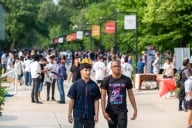You have /5 articles left.
Sign up for a free account or log in.
As college students continued to be identified as having attended the “Unite the Right” rally in Charlottesville, Va. last month, one of them was James Allsup, president of College Republicans at Washington State University.
Though many college students denied holding racist or anti-Semitic beliefs, including Allsup, they were caught in the controversy surrounding the protest, where white supremacists carried torches and delivered racist and anti-Semitic chants. A woman was killed after a man attending the rally drove his car into a crowd of counter protesters.
Allsup stepped down after College Republicans’ national office called for those who attended Charlottesville to step down, but many wanted Washington State to get rid of the club altogether. In an email to state lawmakers on Friday, Kirk Shultz, university president, declined to take actions against the club.
“As emerging young adults who are learning about leadership, decision making, and accountability, we do not tell students who to elect as officers, what events they must offer, or determine the content of their programs,” Schulz wrote, according to The Spokane Spokesman-Review. The club has also come under fire for inviting far-right speaker Milo Yiannopoulos to speak on campus, and building a mock border wall on campus.
“The WSU College Republicans, both its student leadership and the organization as a whole, have officially stated [that Allsup] did not represent the registered student organization in his appearance in Charlottesville,” Schulz said. “The student has officially stepped down from his leadership role in the WSU College Republicans. No state funds, student funds, or university resources were used to facilitate that student’s appearance.”
Many public colleges have spoken out against their students who attended Charlottesville, but also acknowledged that as public institutions, there is little that can be done since the rally falls under First Amendment protection.
“WSU could stop speech of any group that is inciting immediate violence or is intended to directly intimidate specific individuals and cause them to fear for their bodily safety, and is in fact intimidating them,” Beth Hindman, a Washington State media law professor, told The Spokesman Review. “[The university] can also stop speech that is an actual threat of violence that a reasonable person would see as a threat. WSU cannot stop speech that is ‘merely’ offensive.'"








